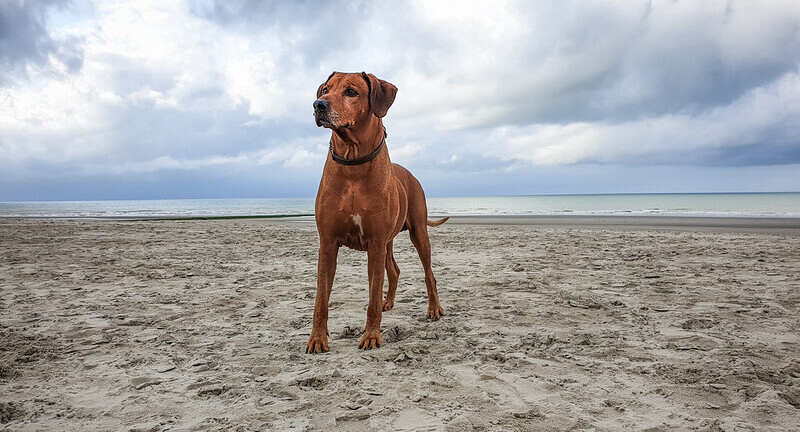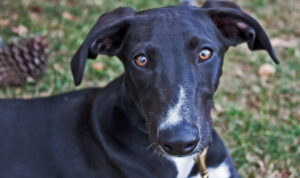The Rhodesian Ridgeback, known for its distinctive ridge of hair along its back, is a dog breed with roots tracing back to southern Africa. Originally bred to hunt lions and other big game, the Rhodesian Ridgeback is characterized by its athleticism, loyalty, and protective nature. In this comprehensive article, we will explore the qualities of this dog breed, including its temperament, care needs, physical traits, shedding light on what makes it such a unique dog breed.
Rhodesian Ridgeback at a glance
| Attribute | Description |
|---|---|
| Temperament | Brave, dignified, independent |
| Social | Aloof with strangers, devoted to family |
| Training | Firm and consistent approach required |
| Grooming | Low maintenance, occasional brushing |
| Care | Regular exercise, mental stimulation |
| Physical Traits | Ridge of hair along back, muscular build |
| Adaptability | Best suited to active households |
| Nutrition | High-quality diet for athletic breeds |

Temperament
Rhodesian Ridgebacks are known for their bold and independent temperament. Their bravery and self-assuredness, stems from their history as hunting dogs. Ridgebacks are fiercely loyal to their families but may be aloof or reserved with strangers. While they are typically gentle and affectionate with their loved ones, they also have a strong prey drive and require firm and consistent training to channel their instincts appropriately.
Social
Rhodesian Ridgebacks are devoted to their families and form strong bonds with their human companions. They are known for their protective instincts and may be wary of strangers, making them excellent watchdogs. However, early socialization is crucial to ensure that Ridgebacks are well-adjusted and can interact appropriately with unfamiliar people and animals. With proper training and socialization, they can be loyal and affectionate companions.
Training
Training a Rhodesian Ridgeback requires a firm and consistent approach. They are intelligent dogs with a strong will, which can sometimes translate to stubbornness. Positive reinforcement techniques, such as rewards and praise, work well with Ridgebacks, but they also respond to firm and confident leadership. Early obedience training and socialization are essential to establish boundaries and ensure that Ridgebacks become well-behaved members of the family.
Grooming
Rhodesian Ridgebacks have short, dense coats that require minimal grooming. They shed lightly throughout the year, with seasonal shedding occurring in the spring and fall. Regular brushing with a soft-bristled brush helps remove loose hair and distribute natural oils, keeping the coat healthy and shiny. Bathing is only necessary when the dog becomes dirty or smelly, as frequent bathing can strip the coat of its natural oils and cause dry skin.
Care
Regular exercise is essential for Rhodesian Ridgebacks to maintain their physical and mental well-being. They are active dogs with a high energy level, requiring daily walks, runs, or play sessions to stay happy and healthy. Mental stimulation, such as puzzle toys or training activities, is also important to prevent boredom and destructive behavior. Ridgebacks thrive in households where they have plenty of opportunities for exercise and companionship.
Physical Traits:
Rhodesian Ridgebacks are muscular and athletic dogs with a distinctive ridge of hair along their backs, running in the opposite direction of the rest of the coat. This ridge, which gives the breed its name, is formed by a strip of hair that grows in the opposite direction to the rest of the coat. Ridgebacks have a dignified and noble appearance, with a strong, balanced build and a confident stride. They are well-suited to various activities, including hiking, jogging, and agility training.
Adaptability:
Rhodesian Ridgebacks are best suited to active households where they have plenty of space to run and play. They thrive in environments where they have room to explore and engage in physical activities. While they can adapt to apartment living with sufficient exercise and mental stimulation, they are happiest in homes with access to a fenced yard where they can roam freely. Ridgebacks are not well-suited to being left alone for long periods and may become bored or destructive if not given enough attention and exercise.
Nutrition:
A high-quality diet is essential for Rhodesian Ridgebacks to support their active lifestyle and maintain their overall health. They require a balanced diet that provides them with the necessary nutrients to support their muscle development and energy needs. Protein-rich foods, such as meat or fish, are important for muscle maintenance, while carbohydrates provide energy for their active lifestyle. It’s essential to monitor their calorie intake and adjust their diet accordingly to prevent obesity, as Ridgebacks can be prone to weight gain if overfed. Additionally, access to fresh water should be provided at all times to keep them hydrated, especially after exercise.
Brief History:
The Rhodesian Ridgeback originated in southern Africa, where it was developed by crossing native African dogs with European breeds brought by Dutch and British settlers. The breed’s distinctive ridge of hair along its back was selectively bred for, as it was believed to enhance the dog’s hunting abilities and provide protection against predators. Ridgebacks were used by early settlers in Africa for hunting game, including lions, and were valued for their bravery, strength, and endurance. Today, Rhodesian Ridgebacks are cherished companions and loyal family dogs around the world.
Quick Facts:
- Rhodesian Ridgebacks are sometimes referred to as “lion dogs” due to their historical role in hunting lions in Africa.
- The breed was officially recognized by the American Kennel Club (AKC) in 1955.
- Rhodesian Ridgebacks are known for their excellent scenting abilities and are sometimes used in search and rescue operations.
- They are versatile dogs that excel in various canine sports and activities, including obedience, tracking, and lure coursing.
- Rhodesian Ridgebacks have a lifespan of 10 – 12 years

Rhodesian Ridgeback as Pets
Rhodesian Ridgebacks make loyal and devoted pets for individuals and families who lead active lifestyles. With proper training and socialization, they can be loving companions and protective guardians. However, potential owners should be prepared for their independent nature and strong prey drive. Ridgebacks thrive on regular exercise and mental stimulation, and they form strong bonds with their human family members. As with any breed, early training and socialization are key to ensuring a well-behaved and well-adjusted Rhodesian Ridgeback.
Lure Coursing Rhodesian
Rhodesian Ridgebacks, with their athletic build and hunting instincts, can do well at lure coursing. This activity allows Ridgebacks to tap into their natural instincts in a controlled environment, providing both physical exercise and mental stimulation. Participation in lure coursing can be an enjoyable and fulfilling activity for both Ridgebacks and their owners, fostering a strong bond and satisfying the breed’s need for activity and challenge.
Rhodesian Ridgeback Price
The price of a Rhodesian Ridgeback puppy can vary depending on factors such as breeder reputation, lineage, and geographical location. On average, Ridgeback puppies from reputable breeders may range from $1,500 to $3,000 or more. Prices may be higher for puppies with desirable traits such as show potential, health certifications, or championship lineage. Additionally, adoption from shelters or rescue organizations is an option, typically costing less and providing a loving home to a Rhodesian Ridgeback in need.
FAQ about Rhodesian Ridgeback
- Are Rhodesian Ridgebacks good with children? – When properly socialized and trained, Rhodesian Ridgebacks can be excellent companions for children. They are protective of their family members, including children, and often form strong bonds with them. However, due to their size and strength, supervision is recommended when they are around young children to prevent accidental knocks or rough play.
- Do Rhodesian Ridgebacks require a lot of exercise? – Yes, Rhodesian Ridgebacks are active dogs that require regular exercise to stay happy and healthy. They enjoy activities such as running, hiking, and playing fetch. Daily walks and opportunities to burn off energy are essential to prevent boredom and destructive behavior.
- Are Rhodesian Ridgebacks good guard dogs? – Yes, Rhodesian Ridgebacks have a natural instinct to protect their families and territory, making them effective guard dogs. They are alert and wary of strangers, and their imposing presence can act as a deterrent to potential intruders. However, proper training and socialization are necessary to ensure they differentiate between welcome guests and real threats.
- Do Rhodesian Ridgebacks get along with other pets? – Ridgebacks can coexist peacefully with other pets, especially if they are raised together from a young age. However, their prey drive may lead to chasing smaller animals, so supervision is recommended when introducing them to smaller pets like cats or rabbits. Early socialization can help mitigate any potential issues and promote positive interactions with other animals.



